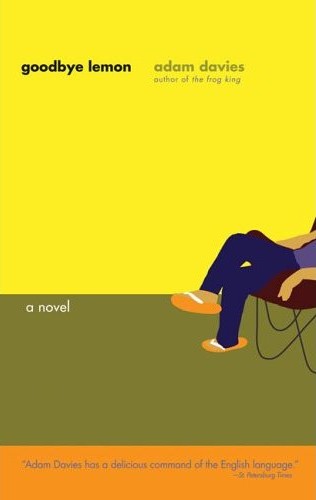 |
| See? No capital letters. Boo. |
Jack has harbored ill feelings (more like intense hatred) for his father for more than 20 years. Now he has been summoned home by his mother to help care for his father who has been diagnosed with "locked-in" syndrome. Being back in his boyhood home he is surrounded by his completely dysfunctional family. The cast of characters include his control freak of a mother, alcoholic older brother, bed-ridden father and worse yet, the memories of his dead younger brother. Jack is finally forced to deal with the reality that is his heart-wrenching past and it's not pretty. Adding to the mix is his girlfriend of two years and a free-spirit of a home health nurse. Each has their own way of dealing with the situation, all of which contribute to a very surprising ending.
What irritated me the most is that for the first two-thirds of the book Jack WOULD NOT deal with his feelings. He does everything BUT deal with them, in fact. He comes up with multiple excuses as to why he cannot help his father and when that doesn't work he tries to commit suicide. After that fails, he turns to the bottle and actually takes up residence in the basement with his brother (and yes, this is when the girlfriends leaves). I wanted to reach through the book and shake the man many, many times.
When I read this book last week I was taken on a journey of emotional lows like I have never read before. Jack didn't want to go see or help take care of his incapacitated father, but his girlfriend kind of pushes him to do so. Hahva, the girlfriend, decides to accompany him, not knowing all of dysfunction she is about to encounter. The poor girl found out some deep family secrets on this trip that she knew nothing about causing her to eventually leave. It was sad. Before she leaves however, they find Pressman, Jack's older brother, drunk and living in the basement. That was even more sad. Furthermore, Jack's mom is so cold she can't be bothered with caring for Jack's father, so that leaves Bess, the home-health aide/therapist, as the only one who really seems to care about the poor man. Really, really sad. (None of this helped me with staying cheery and positive for the two birthdays and anniversary I had last week, by the way).
And finally, I would like to point out that I loved vocabulary when I was in school. I also love to read. But when authors use so many difficult words in one book that you feel the need to keep a dictionary at your side, it's overkill. This wasn't a book about medicine or scientific studies. This was a book about a dysfunctional family that all needed a good kick in the rear. And for that reason, it was annoying to have to look up the words polyphonic tunelet and fimbriated in the same chapter. I would rather he have kept it simple and stuck to the basics.
I will say that I enjoyed the last 60 pages or so of this book. It had a somewhat happy ending and I didn't feel the urge to want to shake someone as badly as I did in the first 220 pages. However, I tend to stay away from the sad books. I know that not all families are perfect (have you met Sarah and Carrie's brother?) but I would rather spend my time partaking in a more blithesome* activity.
*blithesome = lighthearted, cheery

This doesn't sound like anything I would want to read, but I loved your review. You put some levity and laughter into what sounds like a somewhat depressing book. I read to escape reality most of the time. So I don't think this book is for me.
ReplyDeleteUgh. Maybe I should change up what I plan to review for tomorrow, because the book I had in mind also had a main character I wanted to kick in the a$$.
ReplyDeleteYou didn't have to change up your review on my account. If authors would listen to us and write how we tell them, this wouldn't be an issue. :)
DeleteTOTALLY. Besides the JD Robb book fit in so nicely with the text conversation Sarah and I had that it was an easy change.
Delete